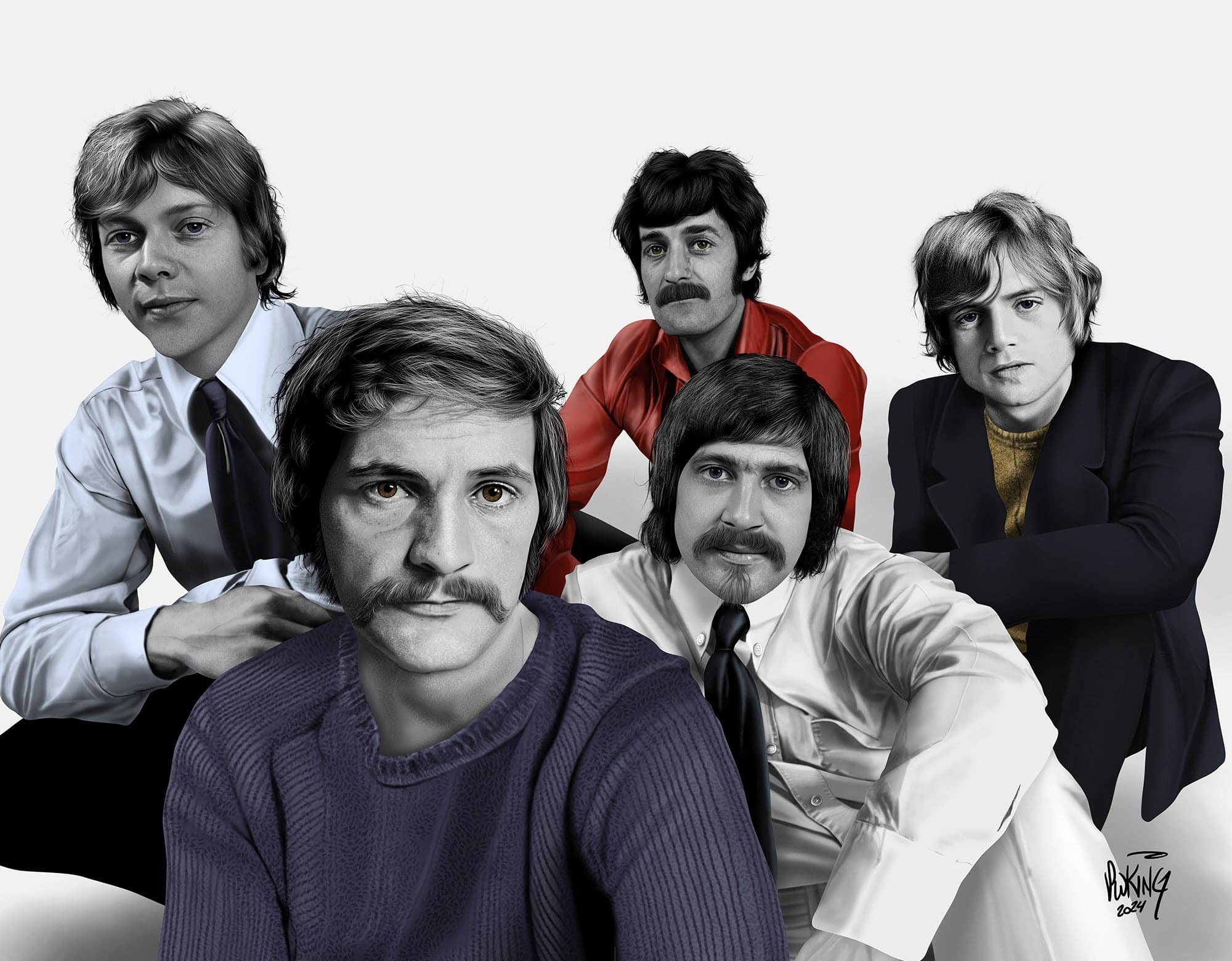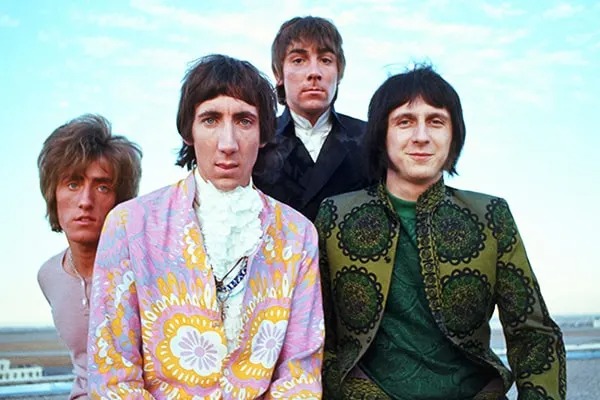Discover the Top 10 Most Entrancing Moody Blues Songs That Will Blow Your Mind
The Moody Blues are an English rock band that emerged in the mid-1960s and became known for their fusion of symphonic and psychedelic rock. Formed in Birmingham, England, the band initially consisted of members Ray Thomas, Mike Pinder, Denny Laine, Graeme Edge, and Clint Warwick. Over the years, the lineup underwent changes, with Justin Hayward and John Lodge eventually joining the group, solidifying its classic lineup.
The Moody Blues gained prominence for their innovative use of instruments such as the Mellotron, which added orchestral textures to their sound. Their music often explored philosophical and existential themes, with poetic lyrics and lush musical arrangements that set them apart from their contemporaries.
One of the band’s most iconic albums is “Days of Future Passed” (1967), which combined rock music with orchestral arrangements and is widely regarded as one of the first progressive rock albums. Tracks like “Nights in White Satin” became enduring classics, showcasing the band’s ability to create atmospheric and emotionally resonant music.
Throughout their career, The Moody Blues continued to evolve their sound, incorporating elements of jazz, blues, and electronic music. Their albums “In Search of the Lost Chord” (1968), “On the Threshold of a Dream” (1969), and “A Question of Balance” (1970) further solidified their reputation as pioneers of progressive rock.
With their rich harmonies, innovative instrumentation, and thought-provoking lyrics, The Moody Blues left an indelible mark on the rock music landscape. Their influence can be heard in the work of countless artists, and their enduring popularity has cemented their legacy as one of the most important bands in rock history.
Nights in White Satin
“Nights in White Satin” is a classic rock ballad by The Moody Blues, released in 1967 as part of their album “Days of Future Passed.” Written by the band’s lead vocalist and flautist, Justin Hayward, the song is celebrated for its haunting melody, lush orchestration, and introspective lyrics.
The song is divided into two parts: the first part is a reflective poem, while the second part is a symphonic rock arrangement. “Nights in White Satin” explores themes of love, longing, and the passage of time, with evocative imagery and emotional depth.
Hayward’s emotive vocal performance, combined with the band’s orchestral accompaniment and lush harmonies, creates a powerful and atmospheric listening experience. The song’s orchestral interludes, featuring the distinctive sound of the Mellotron, add to its ethereal and dreamlike quality.
Upon its release, “Nights in White Satin” was not an immediate commercial success but gained popularity over time, eventually becoming one of The Moody Blues’ most iconic and enduring songs. It reached new heights of popularity when it was re-released in 1972, reaching the top ten on charts around the world.
The song’s timeless appeal has ensured its status as a classic rock staple, and it continues to be celebrated and revered by music fans decades after its release. “Nights in White Satin” remains a defining moment in The Moody Blues’ career and a testament to their talent for creating emotionally resonant and musically innovative music.
Tuesday Afternoon (Forever Afternoon)
“Tuesday Afternoon (Forever Afternoon)” is a captivating song by The Moody Blues, released in 1967 as part of their album “Days of Future Passed.” Written by the band’s lead vocalist and flautist, Justin Hayward, the song is celebrated for its lush orchestration, evocative lyrics, and dreamy atmosphere.
The song paints a vivid picture of a serene afternoon, capturing the feelings of tranquility and introspection that come with a leisurely day spent in nature. Hayward’s emotive vocals, accompanied by the band’s orchestral arrangement and intricate instrumentation, create a rich and immersive listening experience.
“Tuesday Afternoon (Forever Afternoon)” is notable for its use of the Mellotron, an early keyboard instrument that simulates the sound of orchestral instruments. The Mellotron’s ethereal tones add to the song’s otherworldly quality, transporting listeners to a place of peace and serenity.
The song’s introspective lyrics reflect on the passage of time and the fleeting nature of life, with themes of nostalgia, longing, and appreciation for the present moment. Hayward’s poetic imagery and heartfelt delivery resonate deeply with listeners, making “Tuesday Afternoon (Forever Afternoon)” a timeless classic.
Since its release, the song has remained a fan favorite and a staple of The Moody Blues’ live performances. Its enduring popularity and timeless appeal continue to captivate audiences, cementing its status as one of the band’s most beloved and iconic songs.
Question
“Question” is a poignant and introspective song by The Moody Blues, released in 1970 as part of their album “A Question of Balance.” Written by the band’s lead vocalist and guitarist, Justin Hayward, the song is celebrated for its heartfelt lyrics, emotive vocals, and melodic guitar work.
The song reflects on the complexities of life and relationships, grappling with existential questions about purpose, meaning, and the passage of time. Hayward’s introspective lyrics ponder the nature of existence and the search for truth and understanding in an uncertain world.
“Question” is characterized by its gentle acoustic guitar melody, ethereal vocal harmonies, and lush orchestration, which create a lush and atmospheric sonic landscape. The song’s emotive delivery and soaring chorus resonate deeply with listeners, capturing the universal struggles and yearnings of the human experience.
The song’s poignant lyrics and evocative melody have made it a fan favorite and a standout track in The Moody Blues’ discography. Its timeless themes and heartfelt sincerity continue to resonate with audiences, cementing its status as one of the band’s most enduring and beloved songs.
“Question” remains a testament to The Moody Blues’ talent for crafting deeply emotional and thought-provoking music that transcends time and speaks to the human soul.
I’m Just a Singer (In a Rock and Roll Band)
“I’m Just a Singer (In a Rock and Roll Band)” is a dynamic and self-reflective song by The Moody Blues, released in 1972 as part of their album “Seventh Sojourn.” Written by the band’s bassist and vocalist, John Lodge, the song is celebrated for its energetic rock sound, thought-provoking lyrics, and catchy melody.
The song explores the experiences and challenges faced by musicians in the rock and roll industry, grappling with themes of fame, identity, and the pressures of the music industry. Lodge’s introspective lyrics reflect on the tensions between artistic integrity and commercial success, as well as the complexities of being a public figure…
“I’m Just a Singer (In a Rock and Roll Band)” features a driving rhythm, electrifying guitar riffs, and powerful vocal harmonies, creating a dynamic and anthemic rock sound. The song’s infectious energy and memorable hooks make it a standout track on the album and a favorite among fans of The Moody Blues’ music.
The song’s title has become iconic, symbolizing the struggles and aspirations of musicians everywhere. It has resonated with audiences for its candid portrayal of the challenges faced by artists in the music industry, as well as its message of resilience and determination in the face of adversity.
“I’m Just a Singer (In a Rock and Roll Band)” remains a beloved classic in The Moody Blues’ catalog, celebrated for its timeless appeal and enduring relevance. Its powerful message and electrifying rock sound continue to captivate listeners and inspire generations of music lovers around the world.
Your Wildest Dreams
“Your Wildest Dreams” is a melodic and nostalgic song by The Moody Blues, released in 1986 as part of their album “The Other Side of Life.” Written by the band’s lead vocalist and guitarist, Justin Hayward, the song is celebrated for its lush production, catchy hooks, and heartfelt lyrics.
The song reflects on themes of nostalgia, longing, and the passage of time, with Hayward’s introspective lyrics reminiscing about a lost love and yearning to recapture the magic of the past. The song’s wistful tone and emotive vocals resonate deeply with listeners, evoking a sense of longing and melancholy.
“Your Wildest Dreams” features a polished and radio-friendly sound, with a catchy melody, memorable guitar riffs, and lush orchestration. The song’s infectious hooks and sing-along chorus make it a standout…
The accompanying music video for “Your Wildest Dreams” further enhances the song’s nostalgic appeal, featuring footage of the band performing interspersed with scenes of a man reminiscing about his past love. The video’s cinematic visuals and evocative storytelling perfectly complement the song’s themes and add to its emotional impact.
Upon its release, “Your Wildest Dreams” became one of The Moody Blues’ biggest hits, reaching the top ten on charts around the world and earning critical acclaim. It remains one of the band’s most beloved and enduring songs, celebrated for its timeless appeal and heartfelt sincerity.
“Your Wildest Dreams” continues to resonate with audiences decades after its release, serving as a poignant reminder of the power of music to evoke memories and emotions. Its universal themes and melodic beauty have ensured its place as a beloved classic…
The Story in Your Eyes
“The Story in Your Eyes” is a vibrant and emotionally charged song by The Moody Blues, released in 1971 as part of their album “Every Good Boy Deserves Favour.” Written by the band’s lead vocalist and guitarist, Justin Hayward, the song is celebrated for its energetic rock sound, powerful vocals, and introspective lyrics.
The song delves into themes of love, longing, and self-discovery, with Hayward’s introspective lyrics exploring the complexities of human emotions and relationships. The narrator reflects on a past love and the impact it has had on their life, pondering the deeper meaning behind their experiences and searching for answers in…
“The Story in Your Eyes” features a driving rhythm, catchy guitar riffs, and dynamic vocal harmonies, creating a compelling and anthemic rock sound. The song’s infectious energy and memorable hooks make it a standout track on the album and a favorite among fans of The Moody Blues’ music.
The song’s universal themes and heartfelt sincerity have resonated with audiences for decades, making it one of The Moody Blues’ most enduring and beloved songs. Its timeless appeal and emotional depth continue to captivate listeners, cementing its status as a classic…
“The Story in Your Eyes” remains a testament to The Moody Blues’ talent for crafting deeply emotional and thought-provoking music that resonates with audiences on a profound level. With its powerful lyrics, energetic instrumentation, and impassioned vocals, the song continues to inspire and move listeners around the world.
Ride My See-Saw
“Ride My See-Saw” is a dynamic and psychedelic rock song by The Moody Blues, released in 1968 as part of their album “In Search of the Lost Chord.” Written by the band’s bassist and vocalist, John Lodge, the song is celebrated for its catchy melody, energetic instrumentation, and introspective lyrics.
The song’s title serves as a metaphor for the ups and downs of life, with Lodge’s introspective lyrics exploring themes of self-discovery, existential questioning, and the search for meaning and purpose. The narrator reflects on the journey of life, navigating through its twists and turns while seeking inner peace and…
“Ride My See-Saw” features a driving rhythm, swirling organ solos, and soaring vocal harmonies, creating a vibrant and immersive sonic landscape. The song’s energetic instrumentation and catchy hooks make it a standout track on the album and a favorite among fans…
The song’s psychedelic sound and philosophical lyrics captured the spirit of the late 1960s counterculture movement, resonating with a generation seeking enlightenment and self-expression. Its timeless themes and universal appeal have ensured its lasting popularity, cementing its status as one of The Moody Blues’ most beloved…
“Ride My See-Saw” remains a classic in the band’s catalog, celebrated for its memorable melody, spirited performance, and thought-provoking lyrics. With its infectious energy and introspective depth, the song continues to captivate listeners and inspire new generations of music lovers around the world.
The Voice
“The Voice” is a powerful and anthemic song by The Moody Blues, released in 1981 as part of their album “Long Distance Voyager.” Written by the band’s drummer and lyricist, Graeme Edge, along with keyboardist and vocalist, Haywood Lodge, the song is celebrated for its uplifting…
“The Voice” is a song of hope and empowerment, with lyrics that encourage listeners to find strength and resilience in the face of adversity. The narrator reflects on the power of music and the human spirit to overcome challenges and persevere through difficult times, with the titular “voice” symbolizing…
The song’s anthemic chorus and driving rhythm create a sense of urgency and excitement, while the lush orchestration and dynamic arrangements add depth and texture to the music. Lead vocalist Justin Hayward’s emotive delivery and powerful vocal performance further enhance the song’s impact, capturing the listener’s…
“The Voice” became one of The Moody Blues’ biggest hits, reaching the top ten on charts around the world and earning critical acclaim for its inspirational message and catchy melody. Its timeless themes of resilience and empowerment continue to resonate with audiences, making it a beloved classic…
With its memorable hooks, powerful vocals, and uplifting lyrics, “The Voice” remains a standout track in The Moody Blues’ discography, celebrated for its timeless appeal and universal message of hope and perseverance.
Go Now
“Go Now” is a poignant and soulful song by The Moody Blues, released in 1964 as their debut single. Written by Larry Banks and Milton Bennett, the song features lead vocals by Denny Laine, who was the lead singer of the band at the time.
The song captures the pain and heartache of a broken relationship, with the narrator pleading for their partner to leave and go now, as they can’t bear the pain of their presence any longer. Laine’s emotive vocal delivery, accompanied by the band’s soulful harmonies and melodic instrumentation, conveys the…
“Go Now” features a soulful and bluesy sound, with elements of R&B and pop, making it stand out in the British Invasion era of the mid-1960s. The song’s memorable melody, powerful vocals, and heartfelt lyrics resonated with audiences, propelling it to the…
Despite the departure of Denny Laine shortly after the release of “Go Now,” the song remains a defining moment in The Moody Blues’ early career and a classic in their catalog. Its timeless appeal and emotional depth have ensured its lasting popularity, making it a beloved favorite among fans…
Gemini Dream
“Gemini Dream” is a dynamic and synth-driven song by The Moody Blues, released in 1981 as part of their album “Long Distance Voyager.” Written by the band’s lead vocalist and guitarist, Justin Hayward, along with keyboardist and vocalist, John Lodge, the song is celebrated for its catchy melody, pulsating…
“Gemini Dream” explores themes of duality and self-discovery, with lyrics that reflect on the complexities of human nature and the search for balance and harmony in life. The song’s title refers to the astrological sign of Gemini, symbolizing the dualistic nature of the Gemini personality and the inner…
Musically, “Gemini Dream” features a driving beat, shimmering synthesizers, and infectious hooks, creating a vibrant and energetic sonic landscape. The song’s upbeat tempo and catchy chorus make it a standout track on the album and a favorite among fans of The Moody Blues’ music.
The song’s futuristic sound and innovative production captured the spirit of the early 1980s, blending elements of rock, pop, and electronic music into a seamless and captivating sonic experience. Its infectious energy and melodic charm continue to resonate with audiences, making it one of The Moody…
With its memorable hooks, dynamic instrumentation, and thought-provoking lyrics, “Gemini Dream” remains a classic in the band’s catalog, celebrated for its timeless appeal and universal themes. Whether as a reflection on the complexities of human nature or simply as an infectious pop-rock anthem, the song…







